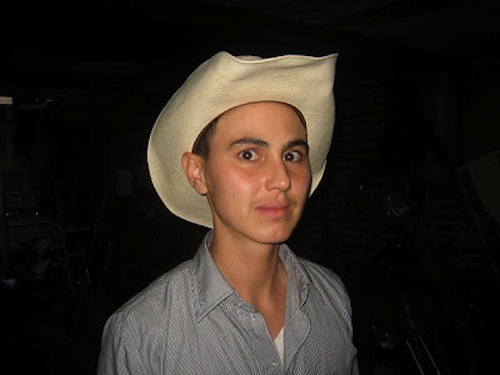Julian T Brolaski / gowanus atropolis / Advice for Lovers
BY Alan Davies

Julian T Brolaski / gowanus atropolis / Ugly Duckling Presse / 2011
Julian Talamantez Brolaski / Advice for Lovers / City Lights / 2012
These Brolaski poems / neoretro in extremis / create neologisms (along the way) out of oldish standards of reference and out of oldish stances toward the language as such (and (perhaps) toward the language not at all (not (not at all)) as such. They are inventions.
Reading them is not at all unlike reading Hugh MacDiarmid’s poems / those ones that are a mixture of English as we know it and of Scots as we don’t. That means that it is a parade through the unfamiliar – with the familiar forcing (or easing) forward those parts (of us) that would otherwise (want to) stay behind. It is a poetry that is in motion (more than is usual for poetry).
These poems see the world in a rather odd way – it’s as if the attention of the eye (the senses) toward what’s-out-there is somewhat oblique (as if someone does not want to get caught (caught) looking (as if someone does not want to get caught looking)) / while (at the same time) the mind is acutely sensitive to what the senses provide (it).
They make the world by taking scrapings from it.
The language goes off by itself to be brilliant.
We go with it – the poems invite us to do that / (entice).
This is a poetry of ecstasy – the language is aware of itself / but it is ecstatic (nonetheless). The ecstatic is somewhat subdued – but it percolates continuously / it boils just below the surface of the language / and it expresses itself (in part) as this glossolalia (anything but echolalic). The spirit of vision – the vision of spirit.
The poems get brighter as the reading accumulates – it takes time to adjust your eyesmindsmindseyes to this kind of crafted splendor.
Behind the brightness there is / there and here / a background of at least slight drollery – this is the ground in which the brightness takes pleasure in being bright.
With a kind of polite playfulness / the words are trying to get at the words.
We’re being allowed to set ourselves at least a bit adrift in the lamplights from Finnegan’s Wakeland.
And they are revelatory / these poems. They are the works of the mind of a hermit / (of whatever sort). Brolaski is (relatively) alone in the den / on the island / these poems come from – perhaps that is why he is inviting us (gently / suggestively) to come along.
Without the future to be revelatory of / they are kind of socked in / revealing themselves to themselves. Are you listening?
The poems speak of / and from / great freedom – any writing that evidences this freedom at the level of words represents a kind of upswelling of the language into itself.
*
The Advice for Lovers poems are less to do with word-creation and more to do with wordplay. They are obedient to the conceit which is their title / which is to say that they are a manual for use by lovers / before during and after the event(s) of love.
They play more with forms / particularly that of the sonnet / long the abode of words of and about love and lovers and beloveds. There are poems stanzaic / and prose poems (these latter might be little essays).
Rhyme is still a pleasure / especially when we realize how silly it once was.
His sense of love is playful and lustful and full – whose isn’t? – but here it gets poetryized.
*
Poet and essayist Alan Davies was born in Alberta, Canada, and earned his BA from Atlantic Union College...
Read Full Biography

